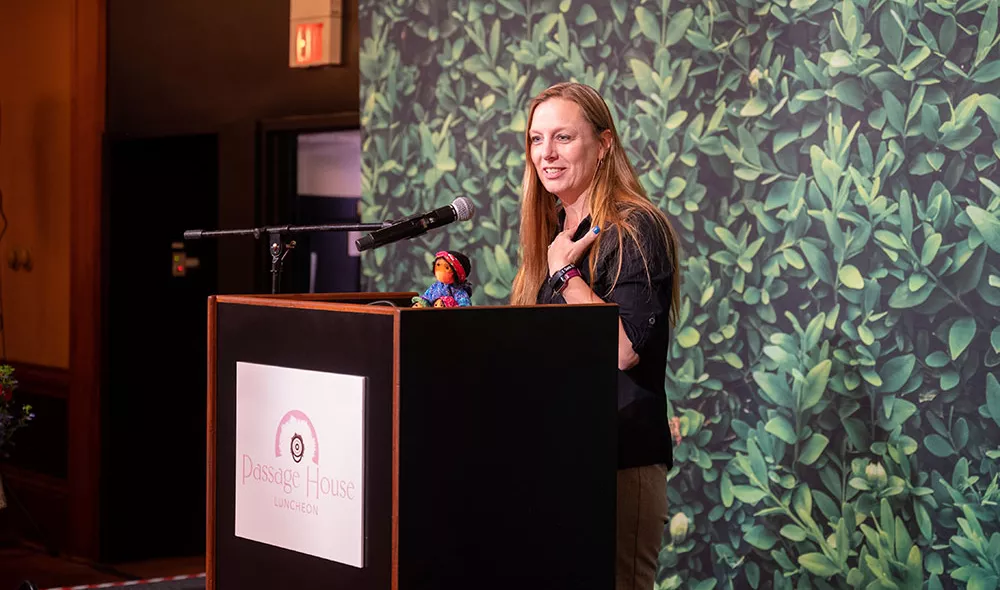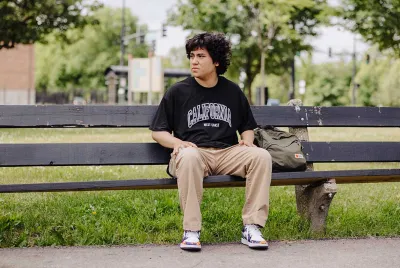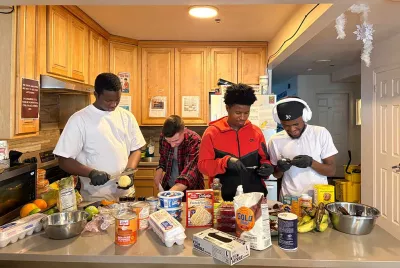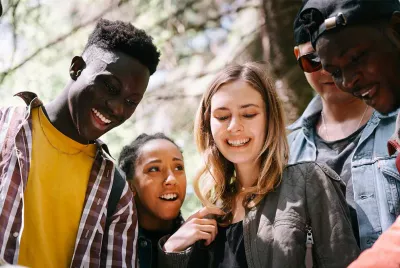It Will Take Us All to End Human Trafficking

FBI Special Agent Jolene Goeden has spent her entire 20-year career fighting crimes against children and youth in Alaska. When it comes to keeping them safe from traffickers, Jolene’s long collaboration with Covenant House Alaska has allowed both CHA and the FBI to stay on top of new threats to young people and build a community of safety and healing around them.
“Everyone has their lane in this work,” Jolene says, “but those lanes intersect. It’s so great when we can work together and provide that wraparound that youth need to have both housing and all their basic needs met, and then, also, to feel safe.”
Young people facing homelessness are especially vulnerable to traffickers, who thrive on the needs of those they seek to exploit. “Trafficking is all about vulnerability,” Jolene says. “Traffickers are looking for any ‘in’ they can get into a person’s life to fill a void. There are so many different vulnerabilities: homelessness, challenging home situations, lack of parental figures in a youth’s life, sexual trauma, substance use, mental health, and just self-esteem issues,” she says to name a few.
On her very first case 20 years ago, Jolene encountered a young survivor who helped her see that nexus of vulnerability and exploitation. The girl was just 13 or 14 years old. She’d been trafficked, but, like so many victims, wasn’t shackled, nor were her movements restricted. Jolene asked her why she didn’t just run away.
“She said she could be back home forced to have sex with her grandfather for free or she could be here in Anchorage getting paid for it,” Jolene recalls. “It was so sad on the one hand, and I was so angry on the other. Nobody should ever have these as her only two choices.”
Covenant House data show that nearly 20% of our residents in the U.S. and Canada (and more than 50% at our sites in Latin America) are trafficking survivors. More than one in four youth facing homelessness in the U.S. and Canada are offered money for sex on their first night unhoused. Along with our immediate care, Covenant House offers youth education, workforce development, and case management services that help them see other choices for their lives.
Trends in Exploitation
Over the nearly 20 years of her collaboration with CHA, Jolene has seen new and worrisome trends emerge that create expanded opportunities for traffickers to take advantage of children and youth. “We’ve seen an explosion on the internet with social media and apps that have opened the door for traffickers,” she says. “Recruitment can happen online, and that’s created a significant safety issue for youth.”
Much of the danger young people face online has to do with the anonymity social media and the internet provide to traffickers. It also has to do with how young people engage online. There’s a big difference in how youth approach social media compared to how older adults do so, Jolene says.
“Young people may have 500 or 1,000 followers on social media, most of whom they have never met in person and don’t even know,” she explains. “That’s something we talk about a lot with Covenant House. Covenant House has their finger on the pulse in terms of what’s happening with youth and the social media apps they use. So, we intersect with them to talk about that and how to keep youth safe.”
Another risk factor that has emerged in Alaska over the past two decades is the increase in travel to and from the state. “When you look at that from a trafficking standpoint,” she says, “it means victims are being moved out of Alaska more often. And it means traffickers are coming to Alaska specifically to traffic not just young people but Alaskans in general.”
Jolene says there are moments when travel to Alaska is heavier and the demand for commercial sex greater than usual. Summertime, when tourism picks up, is one such moment. But any major conference or event that draws a crowd can also draw traffickers. “We’ve worked with Covenant House to build awareness around that as well,” she says.
Another area of common concern in recent years is the wildly escalating opioid crisis. CHA Senior Director of Programs Randi Breager says that pushers begin by giving youth fentanyl pills for free, then slowly raise the price. When youth are hooked and using 10 to 15 pills a day, they become desperate to afford them. “That has compounded our concerns about survival sex,” Randi says.
“And we’re seeing that impact in the world of trafficking,” Jolene underscores.
National Human Trafficking Prevention Month
January is National Human Trafficking Prevention Month in the United States, and Jolene says this is a good time for Covenant House’s community of supporters, youth, and staff to take stock of new trends like these and the ways traffickers continue to evolve their criminal enterprise.
“Education is super important,” she says. “Even when we think we have it all figured out and we know what trafficking is, tomorrow it may look different, or there’s a new twist or a new trend.”
The good news is, Jolene says, that even while traffickers have adapted and evolved their methods and approaches to prey on young people’s vulnerabilities, so, too, has awareness of their criminal activity grown and expanded, and that awareness is making a difference.
“Fifteen years ago, we couldn’t get people to listen to us about trafficking. Nobody thought it happened in Alaska; that’s what we kept hearing,” Jolene says.
“It took collaborations like this one with Covenant House, working together to identify traffickers and put them in jail, and having young people who were willing to tell their stories about what happened to them for us to get the word out to the community that, yes, this is really happening,” she says.
The fact that Jolene and her colleagues have continually shown up at Covenant House for nearly 20 years has not only been supportive to our staff but to the youth as well, building trust with them and helping them see a side of law enforcement they may not have seen before.
As Jolene says, caring for survivors and working to end human trafficking “really does take a village.”
Visit the anti-trafficking page at covenanthouse.org to learn more and share what you learn with others to keep young people in your area safe. You are making a difference.
Photo caption: FBI Special Agent Jolene Goeden attends a luncheon at Covenant House Alaska. Photo courtesy of FBI.
You might also like...
Shelter Is Only the Beginning
From crisis to care: Find out what it's like when a young person enters our doors.


